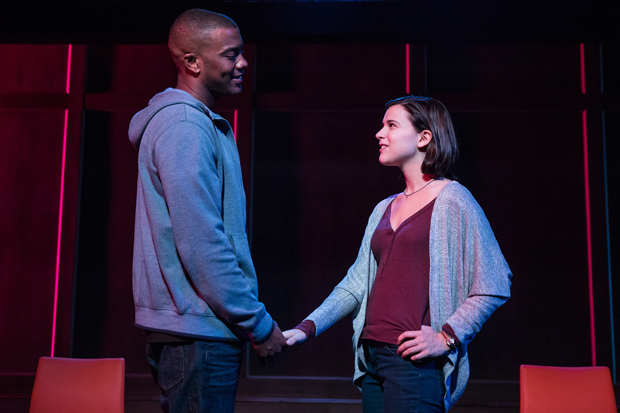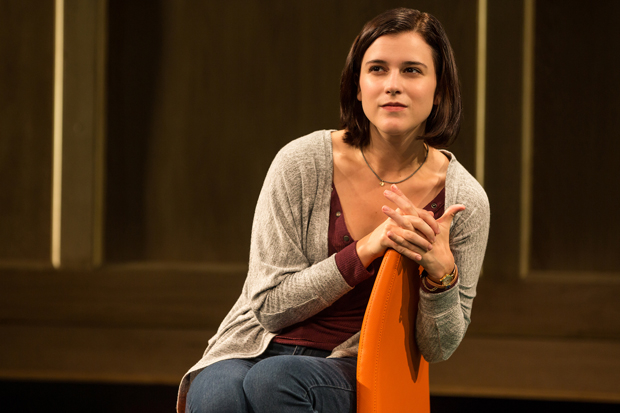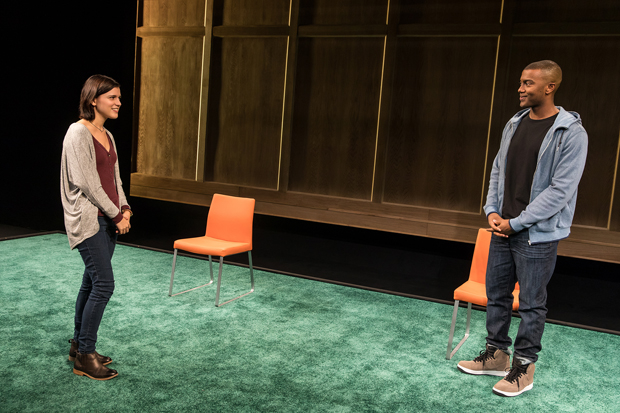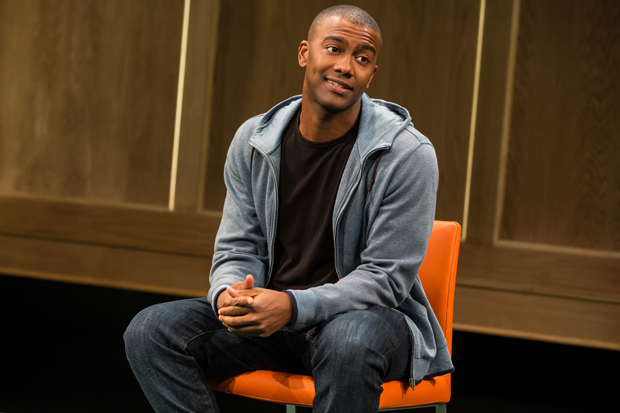Actually

(© Matthew Murphy)
"Maybe these people will hear what they want to hear no matter what," a Princeton freshman speculates about the panel of professors and administrators who will adjudicate her claim of rape against a fellow student. "Maybe they decided in the first five minutes what they thought happened." At a very young age (and at a university, no less), she has learned a depressing truth: Belief usually precedes evidence. That's one of the larger takeaways from Anna Ziegler's Actually, which is now making its New York debut with Manhattan Theatre Club at New York City Center. It's a gripping portrait of campus rape that frustratingly misses the wood for the trees.
One of those trees is Amber (Alexandra Socha), the aforementioned freshman, who is white and Jewish. The other is Tom (Joshua Boone), the young black student she has accused of raping her in his dorm room one night. Up to that point, Amber had aggressively courted Tom. Both had been drinking heavily, and Amber made it clear that sex was on the table. So how did they get from there to rape? Much of the play is dedicated to unpacking that story by having the two characters recount their version directly to the audience. It’s a little like When Harry Met Sally, but with sexual assault.

(© Matthew Murphy)
Ziegler's currently running tennis drama, The Last Match, also employs direct address, mostly to eye-glazing effect. It feels more appropriate in this story about the difficulty of determining the truth when all one has to go on is he-said-she-said: After Amber files her complaint, Tom is brought before Leslie, a Title IX administrator. Tom asks, "I'm innocent until proven guilty, right?" Leslie explains that the university doesn't use the same standard of proof as the criminal justice system. Rather, a three-person panel will determine the validity of the claim based on the preponderance of the evidence, which Leslie describes as "fifty percent plus a feather."
These extralegal adjudications are actually happening in universities across the country, something director Lileana Blain-Cruz conveys with a minimalist production that emphasizes highly individual characters in a one-size-fits-all system. Adam Rigg's simple set of two chairs on green carpet draws our attention to the performers while evoking a university quad. Yi Zhao's lighting keeps the frequent time shifts clear, with the flashback scenes bathed in a moody blue and the interrogation scenes a harsh fluorescent. Paloma Young's casual costumes (a hoodie for him; a V-neck for her; blue jeans for both) undergird believable portrayals of college undergraduates.

(© Matthew Murphy)
Impressively, Ziegler has created what feels like real individuals in Amber and Tom, something that comes across clearly in Socha and Boone's layered performances. Socha captures the Amber's fascinating mixture of passivity and assurance. Her rapid-fire cadence meshes easily with her more awkward lines: "Has it been very hard for you, being black?" she asks Tom. As played by Boone, Tom is undeniably charming, a classical musician with a come-hither smile. He radiates confidence, which is why we believe that he believes that Amber consented that night, even though she is no longer sure.
Unfortunately, in devoting much of the play's energy to developing nuanced characters, Ziegler glosses over some crucial questions: Why would a university go through extraordinary lengths to keep these rape allegations out of court (and therefore, out of the public eye)? Won't there always be "reasonable doubt" around date rape cases, making criminal conviction a near impossibility? And when our criminal justice system is already skewed against black defendants, what happens when the burden of proof shifts from beyond a reasonable doubt to the mere preponderance of the evidence? A recent investigation into such adjudications at Colgate University found that in one year, 50 percent of accusations were leveled against black male students, even though only 4.2 percent of the student body was black.
Ziegler attempts to correct this imbalance by adding a feather of her own on the scale for Tom, highlighting Amber's neurosis and the pressure she feels from friends and her attorney (she has one, he doesn't) to follow through with her claim. It's a ballsy choice in the year of #MeToo, but it also makes our viewing less tortuous. I didn't leave conflicted, but sad: sad that regrettable college sexual encounters can sometimes be rounded up to rape; sad that today’s undergrads have these experiences put under a microscope in university star chambers; sad that the inevitable backlash to these extralegal procedures will almost certainly come at the expense of rape victims. Actually isn't really a reevaluation, but a reminder of an unbroken pattern.

(© Matthew Murphy)











